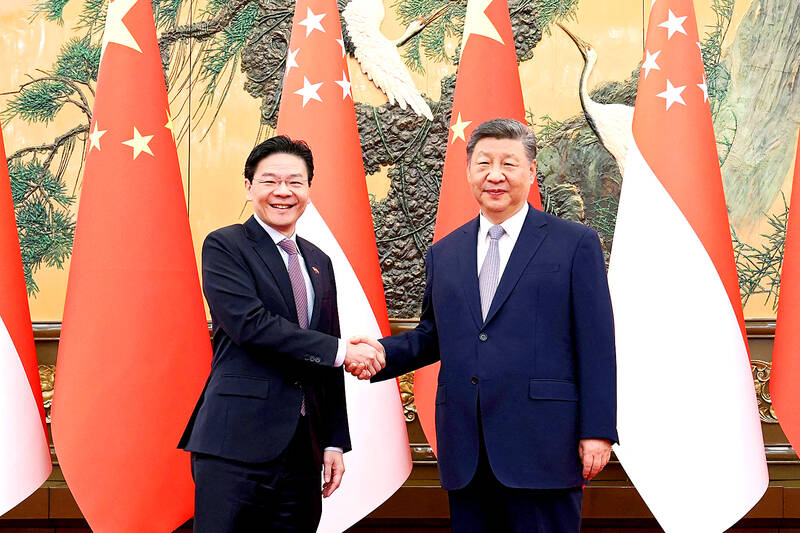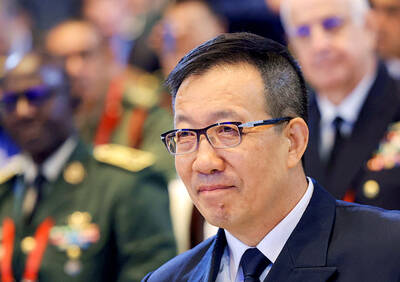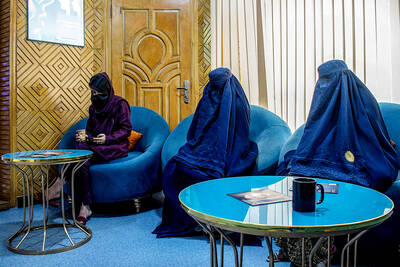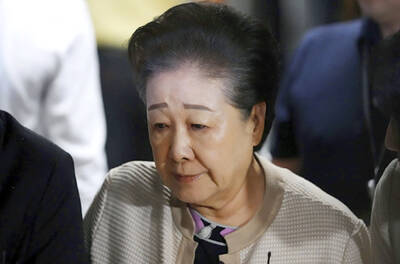Chinese President Xi Jinping (習近平) called on Singapore’s prime minister to join the fight against “hegemony” and protectionism in trade as they met in Beijing yesterday.
Singaporean Prime Minister Lawrence Wong’s (黃循財) first official visit to China lasts until tomorrow.
He met Xi yesterday morning at Beijing’s Great Hall of the People, with the Chinese president urging the two nations to work to “stand on the right side of history, and on the side of fairness and justice,” state broadcaster China Central Television reported.

Photo: Reuters
He told Wong that “the world cannot return to hegemony or be dragged back to the law of the jungle,” a veiled swipe at the US, after US President Donald Trump launched a barrage of tariffs this year on nations including China and Singapore.
Wong, in turn, told Xi he believed the Singapore-China relationship was “more important than before” in a time of “global turbulence and uncertainty.”
“We can work together to establish closer ties and ... continue to strengthen multilateralism and the rules-based global order for the benefit of all countries,” Wong said.
Wong, who last year succeeded former Singaporean prime minister Lee Hsien Loong (李顯龍), the son of founding prime minister Lee Kuan Yew (李光耀), has warned that the trade-dependent city-state could be hit hard by Trump’s tariffs.
Although Trump imposed a baseline 10 percent tariff on Singapore, the nation is vulnerable to a global economic slowdown caused by the much higher levies on dozens of other countries because of its heavy reliance on international trade.
Following his meetings in Beijing, Wong is to head to the northern Chinese city of Tianjin for a meeting of the World Economic Forum.

BEIJING FORUM: ‘So-called freedom of navigation advocated by certain countries outside the region challenges the norms of international relations,’ the minister said Chinese Minister of National Defense Dong Jun (董軍) yesterday denounced “hegemonic logic and acts of bullying” during remarks at a Beijing forum that were full of thinly veiled references to the US. Organizers said that about 1,800 representatives from 100 countries, including political, military and academic leaders, were in Beijing for the Xiangshan Forum. The three-day event comes as China presents itself as a mediator of fraught global issues including the wars in Ukraine and Gaza. Addressing attendees at the opening ceremony, Dong warned of “new threats and challenges” now facing world peace. “While the themes of the times — peace and development —

Decked out with fake crystal chandeliers and velvet sofas, cosmetic surgery clinics in Afghanistan’s capital are a world away from the austerity of Taliban rule, where Botox, lip filler and hair transplants reign. Despite the Taliban authorities’ strict theocratic rule, and prevailing conservatism and poverty in Afghanistan, the 20 or so clinics in Kabul have flourished since the end of decades of war in the country. Foreign doctors, especially from Turkey, travel to Kabul to train Afghans, who equally undertake internships in Istanbul, while equipment is imported from Asia or Europe. In the waiting rooms, the clientele is often well-off and includes men

BRIBERY ALLEGATIONS: A prosecutor said they considered the risk of Hak-ja Han tampering with evidence to be very high, which led them to seek the warrant South Korean prosecutors yesterday requested an arrest warrant for the leader of the Unification Church, Hak-ja Han, on allegations of bribery linked to the country’s former first lady and incitement to destroy evidence. The move came a day after the 82-year-old was questioned over her alleged role in bribing former first lady Kim Keon-hee and a lawmaker. Founded in 1954 by her late husband, Sun Myung Moon, the Unification Church has long been the subject of controversy and criticism, with its teachings centered on Moon’s role as the “second coming” and its mass weddings. Followers are derisively referred to as “Moonies.” However, the church’s

Venezuela on Saturday organized a day of military training for civilians in response to the US deployment in the Caribbean, and amid new threats from US President Donald Trump. About a month ago, Washington deployed warships to international waters off Venezuela’s coast, backed by F-35 jets sent to Puerto Rico in what it calls an anti-drug and anti-terrorism operation. Venezuelan Minister of Defense Vladimir Padrino Lopez has accused Washington of waging “undeclared war” in the Caribbean, after US strikes killed over a dozen alleged drug traffickers off his country’s coast. Caracas also accused the US of seeking regime change, and